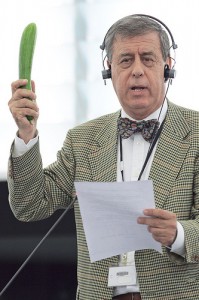
Francisco Sosa Wagner, Spainish MEP, holding a cucumber in the EU Parliament (via European Parliament on flickr)
In late May, 2011, an outbreak of infections related to a rare strain of E coli dominated the news headlines. The source remains uncertain, but the finger pointing that followed the outbreak—Spanish cucumbers, an organic bean sprout farm in Germany—has created billions of dollars in damage to fresh produce farmers across Europe and political damage within the EU and beyond.
This episode raises a fundamental question about what constitutes acceptable scientific evidence in policy making. At each stage in the still unfolding food crisis, a definitive link between symptoms and the identified source has not been established. We now know that cucumbers were not the cause of the outbreak in Germany. Bean sprouts served in a German restaurant have tested positive for the E coli strain, but none of the same strain was found at the suspected farm. Public health officials across the EU have been quick to shift the blame away from their own borders, but tracking down the ultimate source of the outbreak could take months or years, and may never happen.
A prudent policy response to the available evidence would suggest issuing public health warnings against eating suspected produce, but identifying the cucumbers as ‘Spanish’ and the bean sprouts as ‘organic’ suggest something more interesting in the linkage between scientific evidence (E coli found on cucumbers and bean sprouts), and the places (Spain) and methods (organic) of production which are often viewed with suspicion, if not antagonism, in the EU. These subtle linkages neatly integrate prevailing social views with the ongoing and as yet inconclusive scientific investigations, allowing prevailing EU politics to be reproduced in miniature through this event.
Elta Smith is senior consultant at GHK Consulting in London where she provides policy analysis and evaluation support to the European Commission and UK Government on agri-food issues.





